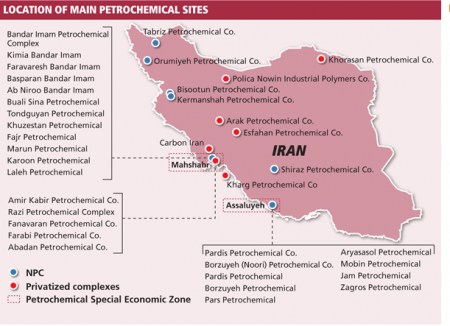Breaking News:

The Dramatic Fall of Mexico’s Oil Giant
Mexico's state-owned oil company, Pemex,…

Kazakhstan's Nascent Auto Industry Thrives Amid Controversy
Kazakhstan's controversial auto recycling fee…
Iran Ups Defenses Around Key Oil Facilities In Wake of Aramco Attack
Iran is upping its defenses around key oil and petrochemical facilities, Iranian state television reported on Monday, cited by S&P Global Platts, as Iran gears up for a retaliatory act just weeks after Saudi Aramco’s oil facilities were struck by missiles.
The areas that will be covered under this increased defense will be air traffic in the south, over the Persian Gulf as well as over the Strait of Hormuz and the Sea of Oman, and will cover area of critical importance to the gas and petrochemical industries such as Assaluyeh and Kharg island.

(Click to enlarge)
source: icis.com
Iran’s defense mounting follows just two days after The New York Times reported that Saudi Arabia and Iran had taken steps to quietly discuss reducing tensions in the Middle East. It also comes days after Israeli Prime Minister Benjamin Netanyahu reportedly was looking for additional defense funds to protect against an Iranian cruise missile attack.
Iran also vowed over the weekend to stay the course when it comes to its oil exports, Iranian Oil Ministry’s website, SHANA, said.
“We will use every possible way to export our oil and we will not succumb to America’s pressure because exporting oil is Iran’s legitimate right,” Iranian Oil Minister Bijan Zanganeh said on Sunday.
US sanctions have hit Iran’s oil exports hard, cutting them down by some 80 percent, while US Secretary of State Mike Pompeo has claimed that the US had managed to take most of Iranian crude oil off the market, saying that nearly 2.7 million barrels had been taken out of the market.
Related: Platts: OPEC Oil Production Falls Most In 17 Years After Saudi Oil Attacks
Iran’s crude oil and condensate sales fell below 2 million bpd in August—the lowest level in over a year.
“Iran’s armed forces have been prepared to powerfully defend air, maritime and land borders,” Major General Abdolrahim Mousavi, commander in chief of Iran’s army said, adding that “there is no gap in the defense… At the moment, the operational arrangement and array is on the highest and best level… we have no worries.”
Mousavi addressed staffers on an oil loading dock on Kharg island during the inauguration, saying that he considered them “as front-line soldiers of the economic war,” S&P Platts reported.
By Julianne Geiger for Oilprice.com
More Top Reads From Oilprice.com:
- Is Bill Gates Right On Energy Investing?
- Capital Flight Is Killing The US Shale Boom
- Brimming Storage And No Buyers: Venezuela’s Oil Production Tanks
Julianne Geiger
Julianne Geiger is a veteran editor, writer and researcher for Oilprice.com, and a member of the Creative Professionals Networking Group.
Open57.81
Trading Vol.6.96M
Previous Vol.241.7B

















In view of the above, there are increasing indications that Saudi Arabia is working on defusing its tense relationship with Iran. Saudi Crown Prince Mohammed bin Salman may have reached the conclusion that Saudi Arabia’s strength emanates from a strong economy and not from antagonizing a powerful and important neighbour like Iran. He may have also concluded that building bridges of confidence between his country and Iran would help his country’s economy and its oil price policies far more than a destructive war in the Gulf.
The Saudi Crown Prince is aware that the devastating attacks on Saudi oil infrastructure have demonstrated very clearly how vulnerable Saudi oil installations are to similar attacks by the Houthis of Yemen. In effect, the entire Saudi oil industry has become hostage to the Houthis. T The Saudis could rectify this situation by ending the quagmire they find themselves in Yemen, save their budget billions of dollars badly needed somewhere else and accept that the Yemeni war is unwinnable. Another reality is that Saudi Arabia is losing confidence in its ally the United States and that is why it is starting to tilt towards the rising Chinese-Russian Alliance.
Dr Mamdouh G Salameh
International Oil Economist
Visiting Professor of Energy Economics at ESCP Europe Business School, London